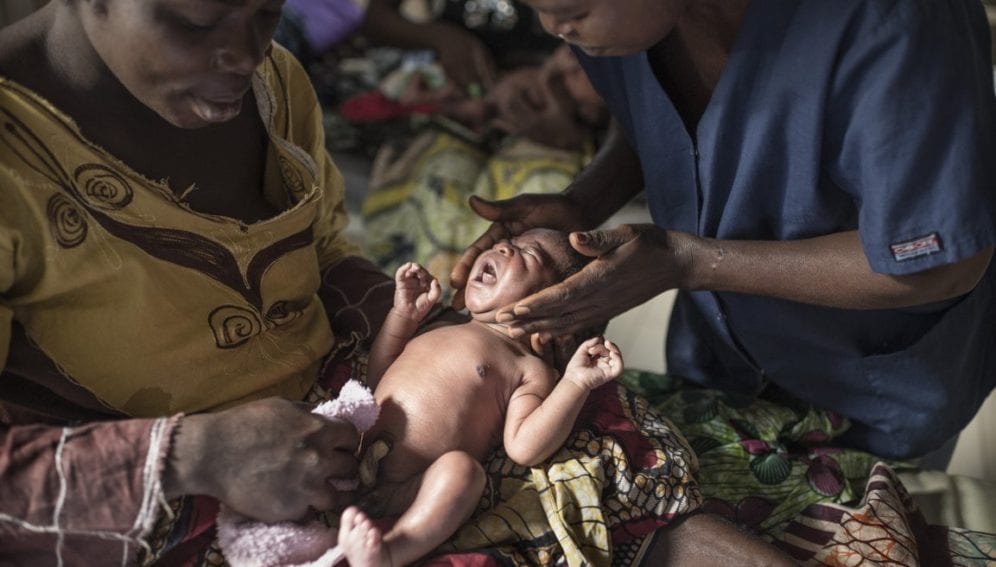By: Dorcas Odhiambo
Send to a friend
The details you provide on this page will not be used to send unsolicited email, and will not be sold to a 3rd party. See privacy policy.
[NAIROBI] A research programme for promoting maternal and child health in Africa has selected two African health policy organisations to bring research results to decision- makers’ attention and influence their implementation.
The two organisations will build critical knowledge in research, policy and practice around delivering primary healthcare to mothers and children in Sub-Saharan Africa, says Anna Seifried, program management officer with the Canadian International Development Research Centre (IDRC) Governance for Equity in Health Systems (GEHS) program, which is implementing the initiative.
The selected organisations, announced on 6 November, are Burkina Faso-headquartered West African Health Organisation and a consortium of Kenya-headquartered African Population and Health Research Center (APHRC); East, Central and Southern Africa Health Community, which has a secretariat in Tanzania and Partners in Population and Development with a regional office in Uganda.
According to the IDRC, each health policy and research organisation will receive a grant of 2.5 million Canadian dollars (about US$ 2.2 million) over seven years.
“Research institutions such as APHRC have a responsibility to ensure that research feeds into local, national and regional policy and development decisions.”
Alex Ezeh, African Population and Health Research Center (APHRC)
Heidi Monk, an acting program officer of IDRC’s GEHS program, says the organisations will facilitate the uptake of evidence into policy and practice by supporting implementation research teams (IRT), which are yet to be selected as part of IDRC’s programme to boost maternal and child health in Sub-Saharan Africa.
They will also build a community advocates, including civil society organisations, academics, government representatives, opinion leaders and champions as well as enable each country’s community of advocates to use rigorously synthesised IRTs’ research evidence to strategically advocate for change in maternal and child health interventions.
The organisations will also enable regional engagement, where a working group of experts will carry out cross-country analysis of IRTs’ research findings and engage government ministries, according to Seifried.
“Research institutions such as APHRC have a responsibility to ensure that research feeds into local, national and regional policy and development decisions,” Alex Ezeh, APHRC’s executive director.
The centre, Ezeh explains, is keen to take on the new role of stepping into the political space that has hitherto been the preserve of knowledge brokerage institutions.
“The value of research in improving the lives of mothers and children is achieved when it is consciously used to drive policy decisions and programmatic actions,” he says.
Maricianah Onono, a research officer with the Kenya Medical Research Institute (KEMRI), says the ultimate purpose of research is to inform action and it is important that research findings are promptly brought to the attention of decision-makers.
“Based on research findings, decision-makers have the opportunity to revise or establish procedures, facilities and programmes,” she says.
Onono explains that nearly 4.7 million mothers, newborn[s] and children die each year in Sub-Saharan Africa due to complications of pregnancy and childbirth.
“Therefore in Sub-Saharan Africa, the most critical health challenge is ensuring the survival and lowering the mortality rates of mothers and their children,” she points out.
Jane Okungu, a reproductive health researcher with KEMRI, adds that neonatal infections such as sepsis, tetanus and diarrhoea contribute to deaths of children.
“Maternal and child health are closely interrelated in Sub-Saharan Africa and significant premiums should be channelled towards addressing the issue,” Okungu says. “Safe motherhood interventions save a significant number of newborns’ lives.”
This article has been produced by SciDev.Net's Sub-Saharan Africa desk.














